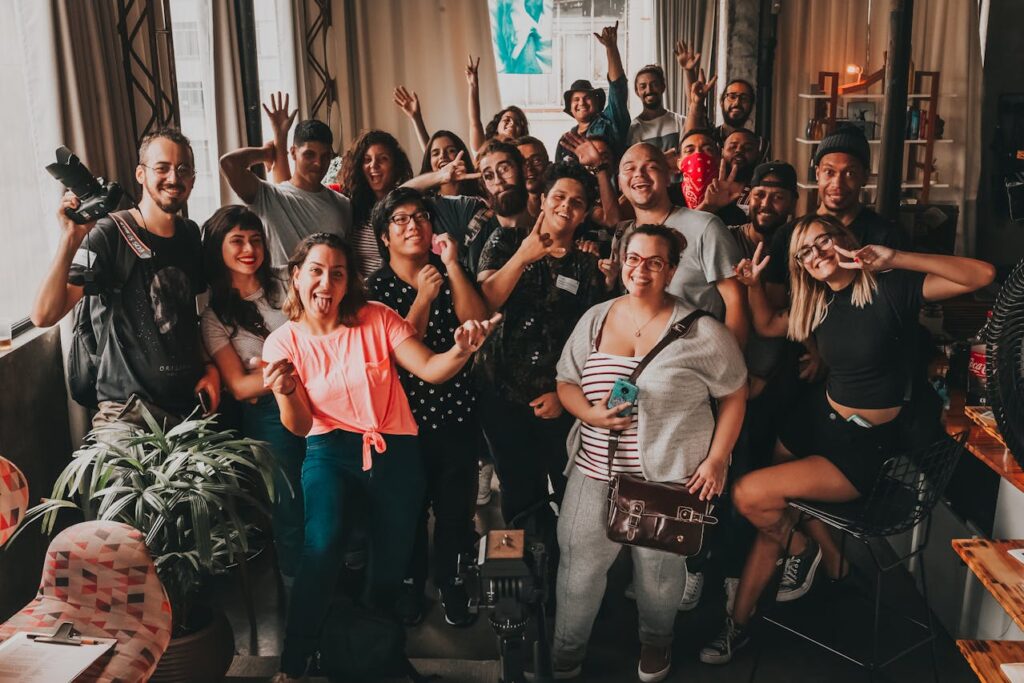When we think about our emotional well-being, we often focus on individual factors like diet, exercise, or personal goals. Yet, one of the most significant influences on mental health is the support we experience from family, friends, and peers. In particular, peer relationships—whether in childhood, adolescence, or adulthood—can reduce isolation, promote stress reduction, and foster a deep sense of belonging. This article explores why spending time with peers is vital for mental health, underscoring the importance of social connections and offering practical strategies to help you cultivate healthy relationships.
The Importance of Social Connections for Mental Health

Humans are inherently social creatures. From early childhood development to older adulthood, our brains are wired to seek out meaningful connections. Research consistently shows that strong social connections help decrease anxiety, lessen the effects of depression, and foster overall well-being. When we engage in face-to-face interactions, our bodies produce beneficial hormones like oxytocin, which improves mood and can even reduce cortisol levels (the hormone associated with stress).
- Stress Reduction: Surrounding ourselves with supportive peers provides emotional support and helps lower our stress response. Conversations, shared laughter, and a sense of belonging all encourage our nervous system to relax.
- Self-Esteem and Confidence: Regular interactions with friends and family often boost self-esteem by reminding us we are valued. This sense of acceptance helps fend off loneliness and depression.
- Immune System Benefits: Research suggests that social isolation may negatively affect our immune system. In contrast, emotional support from peers can strengthen our body’s defense mechanisms over time.
- Suicide Prevention: Feeling connected and supported also significantly reduces the risk of suicidal thoughts and behaviors. Peer support networks can help someone feel less alone during a crisis.
Types of Relationships and Their Effects

Our social world is made up of various types of relationships, each offering unique benefits:
Intimate Relationships
These include family members, romantic partners, or your closest circle of friends. Intimate connections foster deep emotional support through shared experiences, empathy, and continuous encouragement. Such bonds act as buffers against life challenges, helping to reduce anxiety and depression.
Relational Connections
Beyond our inner circle are friendships and acquaintances we interact with more casually—neighbors, coworkers, or community members. These relationships may not be as emotionally intense as family ties, yet they offer variety and perspective. Relational connections still provide meaningful face-to-face interactions that can brighten our day and offset isolation.
Collective or Community Ties
Membership in a group or collective—like a sports team, volunteer organization, or faith-based group—can give you a purpose larger than yourself. Community engagement fosters social connections with like-minded individuals, building a sense of belonging and boosting self-esteem. This collective identity caters to our deeply rooted need to feel useful and needed.
Building Quality Over Quantity in Peer Relationships

In an age where digital platforms boast millions of users and countless “friends” or “followers,” focusing on relationship quality rather than quantity becomes essential. Fifty shallow connections may not offer the same depth of emotional support as a handful of genuinely caring friends. Quality relationships—those that offer empathy, understanding, respect, and mutual support—are far more beneficial to your mental health than an expansive yet superficial network.
- Beyond the Surface: Prioritize sharing personal experiences and listen actively. These deeper exchanges establish stronger bonds.
- Mutual Support: Seek and offer emotional support when necessary, instead of turning every interaction into small talk.
- Consistency: Regularly check in with friends and peers. Consistency fosters trust, and trust forms the core of a healthy relationship.
Digital Connections and Maintaining Healthy Boundaries
While technology can bring people together, excessive reliance on digital communication can yield unintended consequences like social media envy, heightened anxiety, and perpetuated isolation. Striking a balance between online and offline interactions is crucial.
- Healthy Online Boundaries: Set time limits for social media usage. Ensure that virtual conversations supplement, rather than replace, real-life interactions.
- Use Technology Mindfully: Video calls and online forums can be invaluable for connecting with distant peers or for individuals with social anxiety who need a gentler platform. However, make sure virtual interactions do not hinder your ability to engage in face-to-face connections.
- Move Offline: If you meet new friends online, consider transitioning to in-person activities to solidify those relationships.
Peer Relationships Through Life Transitions
Major life changes—such as starting at a new school, switching jobs, or moving to a new location—can strain even the strongest of friendships. Yet these transitions also present opportunities for forging new bonds:
- Childhood and Teen Mental Health: Children and teenagers benefit immensely from stable peer relationships. Encouraging them to participate in clubs, sports, and social activities helps prevent loneliness and promotes healthy childhood development. Parents can facilitate these interactions by scheduling playdates or signing kids up for group-based extracurriculars.
- Early Adulthood: College and early career stages often require building new social circles. Joining campus groups, attending networking events, or teaming up with colleagues for lunch are simple ways to nurture fresh relationships.
- Adulthood and Parenthood: Juggling job responsibilities and family life can restrict free time. Making a conscious effort to stay in touch with old friends and expand your network in parenting groups or community organizations can maintain connectivity.
- Aging and Later Life: Social isolation is a risk factor for older adults, often leading to higher rates of depression and decreased well-being. Retirees may find supportive communities in senior centers or through volunteer work that allows them to remain active, share life experiences, and feel valued.
Strategies for Strengthening Peer Relationships

To experience the full mental health benefits of peer relationships, try integrating these proven strategies into your life.
Communication Skills and Empathy
- Active Listening: Show genuine interest in what others say by making eye contact, summarizing key points, and asking follow-up questions.
- Empathy in Action: Offer thoughtful responses, share your experiences when appropriate, and validate the other person’s feelings. Empathy clarifies misunderstandings and fosters deeper connections.
- Conflict Resolution: Address disagreements promptly and calmly. Use “I” statements to express your feelings while seeking a mutually acceptable solution.
Building Confidence for Introverts and Those with Social Anxiety
- Ease into Group Settings: If large gatherings are intimidating, begin with smaller meetups or one-on-one discussions. Gradual exposure can help build social confidence.
- Practice Self-Care: Before and after socializing, engage in activities that rejuvenate you, such as journaling, reading, or taking a walk.
- Set Realistic Goals: Aiming to make one meaningful connection at an event, rather than “networking” with everyone, may feel less stressful and more achievable.
Actionable Tips for Parents
- Model Healthy Relationships: Children learn by observing. Demonstrate active listening and respect in your own peer interactions.
- Provide Structured Opportunities: Organized clubs, sports teams, or volunteer programs in the community allow children and teens to connect with peers outside of school.
- Support Initiation: Teach kids strategies to approach new friends or invite classmates to a shared activity. Practicing conversation starters at home can reduce social anxiety.
Social Connections in the Workplace
Professional relationships also impact mental health. Employers who foster teamwork and mutual support often see reduced stress levels, fewer conflicts, and higher job satisfaction among employees. Co-workers can become valuable peers, offering camaraderie and shared experiences.
- Teamwork and Collaboration: Working closely on projects fosters trust and emotional support. This environment not only boosts productivity but also mitigates job-related stress.
- Mentorship: Seasoned professionals or supervisors who mentor less-experienced colleagues can create a supportive atmosphere that benefits everyone’s mental health.
- Social Events: Company outings, breakroom conversations, and shared lunches help foster deeper connections beyond work-related tasks.
Loneliness and Its Impact on Health
Loneliness is more than just feeling sad or isolated—it has tangible effects on both mental and physical health. Prolonged loneliness is linked to higher rates of depression, anxiety, sleep disturbances, and even cardiovascular issues. Research shows that loneliness can raise blood pressure, weaken your immune system, and disrupt hormones that regulate stress.
- Physical and Mental Consequences: Chronic loneliness may manifest as fatigue, difficulty concentrating, and an increased risk of self-harm.
- Breaking the Cycle: Identifying the root causes—such as a recent move, social discomfort, or a lack of community engagement—can guide your next steps. Activities like volunteering, enrolling in a group class, or joining a local club help rebuild a sense of belonging.
Cultural and Diversity Aspects in Relationships
Cultural norms heavily influence how we form and maintain peer connections. Some cultures promote collective identity and shared experiences, whereas others emphasize individualism and personal space. Additionally, language barriers or cultural stigmas around mental health can pose unique challenges to building relationships.
- Overcoming Cultural Barriers: Approach unfamiliar cultures with curiosity and respect. Ask open-ended questions about customs, offer to share something about your own background, and seize opportunities for cross-cultural understanding.
- Inclusivity and Empathy: Acknowledge differences in language, traditions, or social norms. Emphasizing inclusivity fosters a welcoming environment for all.
Seeking Professional Help for Relationship Issues
Relationships, no matter how strong, sometimes reach a crossroads where professional guidance becomes beneficial. Therapists, counselors, and support groups offer specialized strategies for managing conflict, addressing communication breakdowns, or coping with deep-seated issues like childhood trauma.
- Therapy and Counseling: Therapists can help unravel patterns of behavior that impede healthy peer interactions or romantic connections. Sessions frequently focus on teaching tangible communication skills and emotional regulation techniques.
- Support Groups: Groups for specific challenges—like social anxiety, grief, or substance abuse recovery—provide an understanding peer circle. Members learn from each other’s experiences and feel less isolated.
- Helplines and Online Platforms: For people dealing with immediate crises, helplines offer anonymous, round-the-clock assistance. Virtual therapy platforms also make professional help accessible for those unable or hesitant to attend in-person sessions.
Conclusion and Call to Action
Peer relationships stand at the heart of mental health. From childhood friendships to supportive coworkers and trusted mentors, the connections we nurture help us avoid isolation, reduce stress, and maintain emotional balance. Rather than chasing a large network of superficial contacts, focus on building genuine, meaningful ties. Embrace empathy, practice healthy communication, and remain open to growth through diverse perspectives.
Whether you’re an introvert seeking smaller, comfortable circles or an extrovert eager to explore group engagements, there’s always room to forge connections that uplift your well-being. Reach out to others, volunteer in your community, and don’t be afraid to try new ways to expand your social horizons. If you find yourself in a difficult situation, remember that professional help—through therapy or reputable support groups—can offer life-changing relief.
Remember: healthy peer interactions are not a luxury but a pillar of your mental, emotional, and even physical health.
Frequently Asked Questions (FAQs)
Q1: How can I help a teenager who is socially withdrawn?
Encourage activities they enjoy and gently help them expand their comfort zone. Introduce structured opportunities like clubs, teams, or volunteer groups. Therapy can also address underlying issues such as social anxiety or low self-esteem.
Q2: What if I feel more comfortable making friends online than in person?
Online connections can be a great starting point. However, prioritize blending your virtual friendships with offline interactions when possible. Shared real-world activities help deepen these relationships and mitigate isolation.
Q3: Why do I still feel lonely despite having many friends on social media?
Digital connections often lack depth and empathy compared to face-to-face interactions. Authentic relationships usually require consistent, meaningful engagement beyond quick chats or likes.
Q4: Are there specific strategies for maintaining friendships through major life changes?
Communication is key. Schedule calls or meetups, even if they’re short. Share updates on your life, and check in to see how your friend is doing. Mutual understanding and regular contact help preserve bonds, even across distances.
By placing a premium on quality over quantity, embracing empathy and inclusivity, and seeking professional assistance when necessary, you can harness the power of peer relationships to greatly improve your mental health. Take the initiative to build and strengthen your connections today—you’ll find that strong social ties can shape a happier, healthier life.



